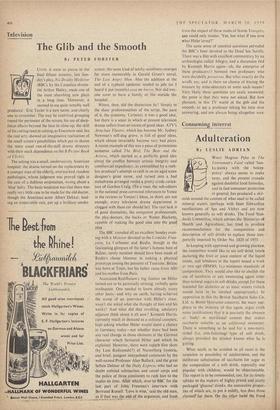Television
The Glib and the Smooth
By PETER FORSTER
UNTIL it went to pieces in the final fifteen minutes, last Sun- day's play, No Deadly Medicine (BBC), by the Canadian drama- tist Arthur Hailey, made one of the most absorbing new plays in a- long time. Moreover, it seemed to me quite notably well produced : Eric Tayler is i new name, and clearly one to remember. The way he contrived grouping round the perimeter of the screen, his use of deep- focus effects beyond the face in close-up, the skill of his cutting (and jn cutting, as Eisenstein said, lies the real art), showed an imaginative realisation of the small screen's possibilities which put to shame the more usual run-of-the-mill drama directors with their stock dependence on the B Picture Book of Cliche's.
The setting was a small, unobtrusively Arnerican hospital; the drama turned on the replacement by a younger man of the elderly, overworked, resident pathologist, whose judgment was proved right in the case of a dubious amputation, wrong about 4 'blue' baby. The basic weakness was that there was really very little case to be made for the old doctor, though the American actor Albert Dekker, lead- ing an impeccable cast, put up a brilliant smoke- screen:- the same kind of tetchy saintliness emerges far more memorably in Gerald Green's novel, The Last Angry Man. Also the addition at the end of a typhoid ,epidemic tended to pile (as heard it put recently) osso on bucco. Nor did any- one seem to have a family or life outside the hospital.
Where, then, did the distinction lie? Simply in the sheer professionalism of the script, the pace of it, the economy. Certainly it was a good idea, but there is a sense in which at present television, drama suffers from an excess of good ideas. ATV's' Armchair Theatre, which has become Mr. Sydney Newman's self-dug grave, is full of good ideas, which almost invariably become very bad plays. A recent example of this was a piece of pretentious nonsense called The Bird, The Bear and the Actress, which started as a perfectly good idea about the conflict between -artistic integrity and commercial expediency; as exemplified by a ruth- less producer's attempt to cash in on an aged scene designer's great name, and turned into a bad . melodrama arranged round a pretty crude carica- ture of Gordon Craig. (To a man, the sub-editors in the national press corrected references to Vence in the reviews to Venice! ) Ideas, in short, are not enough; every television drama department is clogged with them (or should be). The rpal lack is of good dramatists, the competent professionals, the play-doctors, the hacks or Walter Hacketts, capable of making the good idea into the good play.
The BBC rounded off an excellent Sunday even- ing with a Monitor devoted to the Comedic Fran- caise, Le Corbusier and Rodin, though in the, fascinating glimpses of the latter's famous bust of Balzac, surely mention should have been made of Rodin's classic bloomer in seeking a physical prototype among the peasants Of Touraine; Balzac was born at Tours, but his father came from Albi and his mother from Paris.
Associated-Rediffusion's big feature on Hitler turned out to be pictorially striking, verbally quite inadequate. One needed to know already many other facts—and why on earth, having achieved the scoop of an interview with. Hitler's sister, wasn't she asked what she thought of him and his works? And what did that revolting, adulatory adjutant think about it all now? Kenneth Harris, currently much in demand as a cultural compere, kept asking whether Hitler would-stand a chance in Germany today—not whether there had been any real change in those elements in the German character which favoured Hitler and which he exploited. However, there were superb film shots (by Leni Riefenstahl?) of Nuremberg hysteria, and brief, pungent interpolated comments by the well-named Professor Alan Bullock, and the great Sefton Delmer of the Daily Express, who had nO doubt enlisted submarines and camel corps and the police of three continents to rush him to the studio on time. After which, over to BBC for the last part of John Freeman's interview with Bertrand Russell. 'Love is wise,' said the old man, as if that was the end of the argument, and fresh from the impact of those mobs of Storm Troopers, one could only mutter, 'Yes, but what if you love what Hitler loved?'
The same sense of unasked questions pervaded the BBC's hour devoted to the Dead Sea Scrolls. There was'a film with excellent commentary by an archeologist called Allegro, and a discussion (led by Kenneth Harris again—oh, the enterprise of these producers!) between two professors who were decidedly penseroso. But what exactly do the scrolls say, and is there no chance of tracing the treasure by mine-detectors or some such means? Very likely these questions are easily answered; the point is that they were not asked. But how pleasant, in this TV world of the glib and the smooth, to see a professor taking his time over answering, and not always being altogether sure.


































 Previous page
Previous page